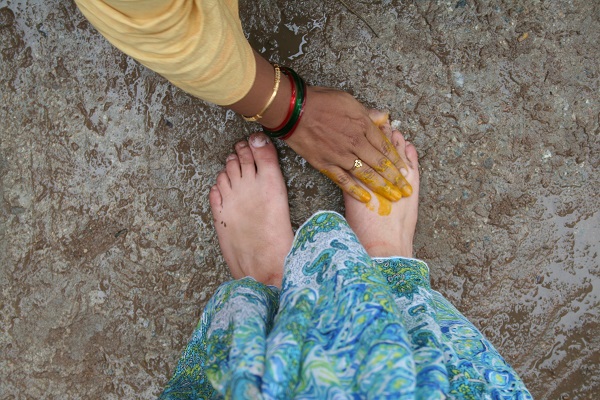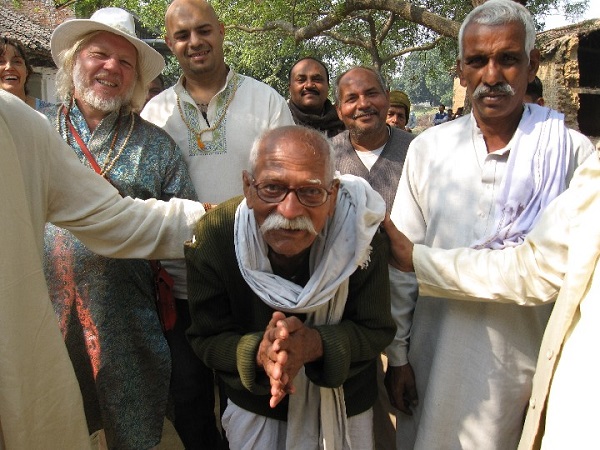Shweyta Mudgal reaches tipping point – she learnt the hard way that tipping waiters is not always a great idea.
 His first tip to me was – “Do not tip.” My dear friend and host, who had been living in Rotterdam, NL for the past two years now, insisted that I abide by the law of the land. More so as I was visiting him from The United States of America, also known as ‘Tip Heaven’ all over the world.
His first tip to me was – “Do not tip.” My dear friend and host, who had been living in Rotterdam, NL for the past two years now, insisted that I abide by the law of the land. More so as I was visiting him from The United States of America, also known as ‘Tip Heaven’ all over the world.
He further elaborated that Dutch waiters wait on you (when they finally do, that is), like they are doing you a favour. More often than not, they do not like their attention being sought. Flagging them down for the check is extremely difficult, hence one is better off walking up to the cashier to pay one’s bill than waiting for it to arrive at the table.
This behavioural trait, observed unanimously by many a foreigner on Dutch soil, intrigued me enough to probe further. Here’s what I found:
Some people attributed this wait-staff nonchalance to socio-political reasons; of the unwillingness of the Dutch to acknowledge the subservient position of waiting staff. The general belief was that the culture of tipping only fosters a master-slave relationship, ill-suited to this nation where people were meant to be social equals. Some others boil it down to being the natural consequence of a ‘tip-less culture’.
Since the Dutch government requires for all taxes and service charges to be included in the published prices of hotels, restaurants, cafes, nightclubs etc, it is not required of the customer to tip a certain percentage over the total amount on the check. Thus, the locals generally tend to leave behind coins or small change as a tip, if at all.
To me, this issue became the Dutch service industry’s equivalent of ‘What came first – the chicken or the egg?’ Had this culture of scarce or no tips come about because of the general lackadaisical service one experiences here, or was the Dutch waiter perpetually disinterested in serving patrons, because he knew there would be no tip at the end of it anyway?
Where I was travelling from, the United States, leaving a tip at a restaurant was probably as mandatory an aspect of eating out as was paying at the end of a meal. Tipping had flourished in the US as a social institution over the years.
It is common knowledge that American wait-staff make minimum wage and that tipping is used to subsidise their sub-standard pay at the workplace. So effectively, when one dines at a restaurant in the US, whether one is pleased with the service or not, leaving a tip equivalent to at least 15 to 20 per cent of the bill is the norm. This could be argued with, especially as the act of tipping is considered a discretionary one.
Yet most Americans will tell you that tips left behind are usually distributed to multiple employees of the restaurant. So even if your server screwed up your order or you spent half your dinner eating with one hand up trying to eternally vie for your server’s attention, it wouldn’t be fair to penalise the busboy, bartender, food runners, and other employees in the food chain, who depend on this money to make their living.
In fact, it is now commonplace for some American restaurants to add a ‘mandatory tip’, also known as ‘gratuity included’ to their customers’ cheques, especially for larger parties – say, a table of six or more. This notion itself causes quite a stir. For example, would a table of four adults and two babies be considered a table of six, even though the babies only sit at the table, but eat nothing? And is a restaurant justified in imposing a ‘mandatory’ tip on a meal, when essentially the customer should be free to exercise discretion in leaving as little or as much as he or she wishes to?
Compared to the US, most European nations fall somewhere in the ‘no-tip to low-tip’ zone. In most European countries, a flat service charge is usually included in the restaurant bill or the tip amount is most probably built into the menu pricing. Since the restaurant staff here, unlike their American counterparts, are generally well-paid, tips are only considered as a small ‘bonus’ meant to reward great service or for simplicity in rounding the total bill to a convenient number. Or, as I discovered to my surprise, for minding a restaurant toilet. Yes, while one can leave a table without a tip in Europe; good luck trying to leave a toilet without one!
It is not extraordinary for toilets, even those within restaurants to be manned by tip-seeking keepers. I remember getting sent back to my table from a restaurant toilet in Paris once to get some coins for the toilet-keeper’s ‘tip-dish’. That is when it dawned on me – in Europe, while table service seems to come free, toilet-service surely doesn’t. Pay to pee, one must!
In Asia, on the other hand, tipping can be a tricky matter.
In Chinese, Japanese and South Korean cultures, to leave a tip may be considered downright offensive and rude, while at times causing confusion and having the waiter come chasing after you to return the ‘extra money left on the table’.
In Japanese cultures, the act of handling money itself warrants an etiquette – something I’ve only recently learnt through a small episode at the local Japanese grocery store in Singapore. A few weeks ago, I found myself at the receiving end of a long hard stare in my fiscal transaction with an old Japanese female cashier. Somewhere between balancing the baby’s stroller and my multiple shopping bags, I fumbled in my purse and casually put some cash down on her table to pay my bill. It was when she did not pick it up, that it hit me. Something was wrong!
A conversation with a friend later revealed that I had belied the appropriate Japanese etiquette of money give-and-take. I should have been respectfully holding the note, with both my hands and instead of having kept it on the table for her to pick it up, it should directly have been handed over to her. Money kept on a table is only considered appropriate in the Japanese culture if placed within an envelope. And that, if at all, is the only way the Japanese would accept a tip.
Since then, having groomed myself into this cash-exchange etiquette, I now feel a pleasant vibe coming my way each time I shop at the Japanese store. Following it up with a slight bow at the end almost always gets me a smile with a happy acknowledgement in return.
Almost all of the remaining SE Asian countries, as I have noticed on my recent travels, do not expect tips at restaurants. Although the influx of Westerners and global exposure is soon changing that, especially in the high-end restaurants in big touristy cities, it is still socially acceptable to not tip at all or leave small change/coins that one wants to get rid of, with the check.
In Singapore, for instance, one is not expected to tip at a restaurant, although one does end up paying a 10 per cent service charge, 4 per cent GST (Goods and Services Tax) and 1 per cent government tax on the bill. The service charge ends up in the owner’s pocket, from where it trickles down into the pockets of the restaurant workers, thus rendering the act of tipping by customers a redundant aspect of eating out here.
In India, tipping at restaurants has more recently come of age. I still have memories of coins being left behind in the ‘saunf’ container at Udipi restaurants, when I was growing up in the 80’s.
To the desi lower middle class, the concept of tipping might still mean leaving behind some ‘chhutta paisa’, but for the noveau-riche and upwardly mobile, it is becoming an integral aspect of the dining-out experience. In fact, one can often find examples of restaurant regulars tipping in advance to make sure they are well taken care of. TIPS does mean To Insure Prompt Service, after all.
A classic stereotypical example here would be of the global desi; one who has moved back after having lived abroad for a few years or the Non Resident Indian who visits once in a while and insists on tipping a credible percentage of the bill at a restaurant.
Having been there and done that, I have often been subjected to a “Don’t spoil it for the rest of us,” lecture by the residents (mostly my parents and/or friends living in India). A recent chat with a fellow NRI friend revealed that she had been through a similar experience, when she once tried to let a rickshawwallah in Hyderabad keep the change or left an unusually high tip at a local restaurant. Her argument was that the sum of money, while relatively insignificant to her, might be of a substantial value to the receiver. Both of us discussed how our generous gratuity-giving habits have landed us in trouble on our trips back to India. At various points, we have been accused of at least one of the following – driving up local inflation, causing a temporary imbalance in the everyday way of life and/or creating an increase in expectations for all travellers who follow, only because we were gracious tippers.
To all those desi skeptic friends of mine, I have just one thing to say:
T-I-P-S spelt backwards is S-P-I-T. If you spare the waiter of the former, the next time you visit, he’s going to make sure he serves you the latter. In this case, quite literally, what goes around, comes around! And that might not be worth it at all!
* ‘Tipping is not a city in China’ is one of many smart and quirky inscriptions found on tips jars all over the world, reminding customers that tips are welcome. Ironically though, tipping is not a custom in China.
A Mumbaikar by birth and a New Yorker by choice, recently-turned global nomad Shweyta Mudgal is currently based out of Singapore. An airport designer by day, she moonlights as a writer. ‘Outside In’ is a weekly series of expat diaries, reflecting her perspective of life and travel, from the outside-in. She blogs at www.shweyta.blogspot.com and confesses that once a thrifty tipper, she is now a generous one, thanks to her husband.
(Picture courtesy tippingresearch.com)





I liked reading most of the article. Except for the last part.. the tipsspit scare.
I don’t really know if that is true. Do you?
Also I consider myself a decent tipper. Here and back in India too. And yes, on occasion, I’d apparently spoiled it for my folks hanging out with me..
Here I tip because I know how the “dine in” restaurant industry works. And I tip in India because.. I feel they don’t deserve any less, if I can afford it.
Good article.. except for the “tip if you don’t want spit in your food part” 🙂
Hi Sachin,
Glad to hear that you liked the article 🙂
The TIPS-SPIT was really more a wordplay; not to be taken literally. What I meant to say is, if you do not tip well and return to the restaurant/ salon/ establishment the next time, there is a big chance that you will be remembered as the poor tipper from last time and the level of service towards you might be compromised. It may not be the case always, but there is a high probability there.